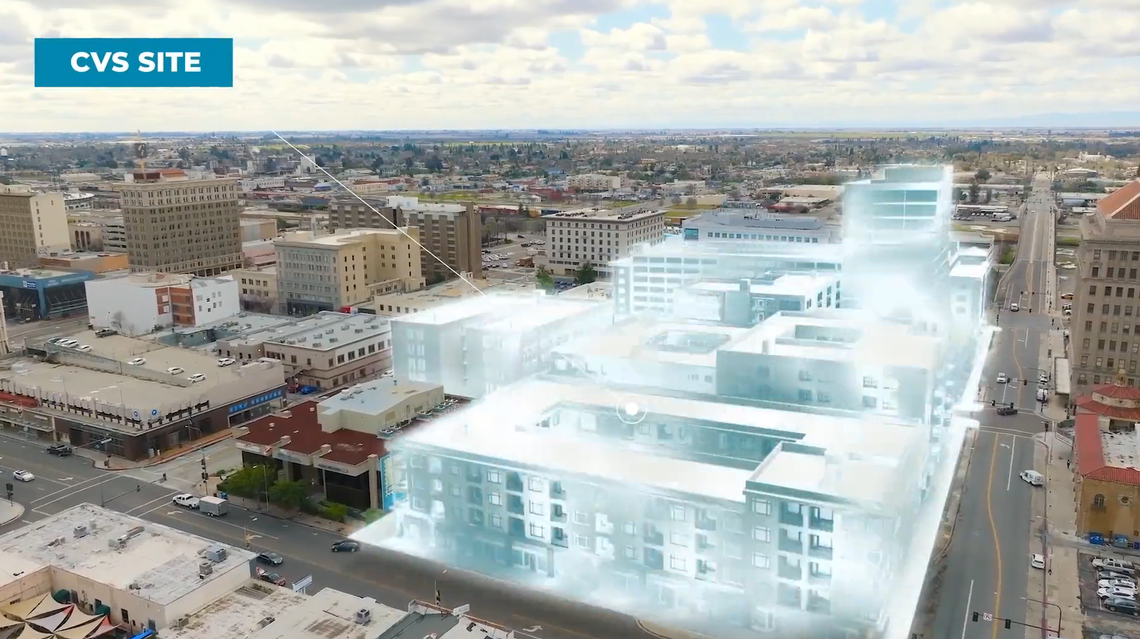California budget crisis threatens to stall downtown, Chinatown improvements in Fresno
A bleak California state budget picture threatens to stall $200 million that the city of Fresno is counting on for its ambitious plan to reinvigorate its downtown and Chinatown districts.
Fresno Mayor Jerry Dyer, in his State of the City address Thursday, said he was notified last week by Gov. Gavin Newsom’s office that the money — part of a $250 million infrastructure allocation pledged last year by the state to be dished out over three years — is subject to a likely deferral for two years. The city has already received $50 million, and additional installments of $100 million each were to be distributed in the 2024-25 and 2025-26 budget years.
Earlier this year, the state announced that a projected budget deficit of $38 billion was prompting a one-year deferral of the next two installments.
“Last week we were told the deferment could be for up to two years,” Dyer said in his address. “This delay in funding, coupled with prolonged street closures from high-speed rail construction, is devastating our downtown and Chinatown revitalization efforts.”
After the speech, Dyer elaborated on the complications that the delayed money could create. “The initial (one-year) deferment was not a surprise, and I was glad the governor chose not to eliminate it from the budget,” he told The Fresno Bee. “A deferment is much better than a cut.”
“But I was shocked to hear there would be the possibility of a second year of it being deferred,” he added. “The reason is we had ramped up our hiring for our Capital Projects Department, and we have a lot of things in motion in terms of planning and pending contracts. Now those things are possibly going to have to be put on hold, which means we can’t continue with construction.”
The $250 million from the state, along with a separate $43.7 million allocation that Dyer hopes the city will receive this year, are intended to pay for improvements to infrastructure in the downtown and Chinatown areas, including new sewer and water mains to replace pipes that are more than 100 years old in some places; and new garage structures to provide much-needed parking.
The infrastructure work is to be a springboard for attracting more residential development in the downtown and Chinatown neighborhoods, with the hope that more people living downtown will attract more commercial development including retail, restaurants and nightlife.
But “the longer we wait to construct, the more prices go up, more labor costs and more materials costs,” Dyer said. “And so deferments ultimately prevent us from doing as much as we possibly could have done if those monies were funded up front.”
Dyer said the city recently inked a contract for work on the water and sewer mains that will begin in June and be completed by the end of 2025. While that project isn’t jeopardized by a delay in the state funds, at least one, and possibly two, parking garages could end up on the back burner.
One of those parking structures is planned to be built at the site of the former CVS Pharmacy store at Fulton and Tuolumne streets; another is envisioned on H Street between Inyo and Mono streets, south of Chukchansi Park baseball stadium.
“When the $43.7 million comes in, we’ll be able to do the one by CVS,” Dyer said, “but we won’t be able to do the one by the stadium, and we need that parking badly.”
The breakdown of the plans for which the $250 million was awarded last year included about $70 million to build the two new parking structures with a total of about 2,000 parking stalls, essentially doubling the existing number of city-owned parking spaces in the area. The projection is that those additional parking spaces will be enough to serve between 2,000 and 3,000 residential apartments in the downtown area.
Other projects for the money included:
$80 million for overall infrastructure investments to promote housing development for 10,000 residents and other neighborhood revitalization efforts.
$25 million for a storm water drainage basin downtown.
$20 million for an intermodal transit center, in conjunction with a future high-speed rail passenger station, for alternatives to driving, including buses, bicycles and walking.
$20 million for improvements to streets, sidewalks, curbs and gutters in downtown Fresno and the neighboring Chinatown area.
$15 million for pocket parks, linear parks and other green spaces.
$10 million for sewer system upgrades along Fresno and Merced streets in downtown.
$10 million for a 16-inch water supply loop along H and F streets between Stanislaus and Mono streets.
“We’re working as fast as we can,” Dyer said. “We were told at the beginning that it was important to accomplish as much work as possible as quickly as we could to show results so we wouldn’t lose the dollars.”
“So now we’re working feverishly,” he added. “We just awarded a contract on all of our sewer and water mains, and now to be told there’s possibly going to be a deferment, along with all the shutdowns of streets that we’ve seen in downtown and Chinatown, really sets us back.”

